Voices of resilience: The perspective of persons with disabilities in armed conflict
Ukraine
Novyi Bug Inclusive Resource Center
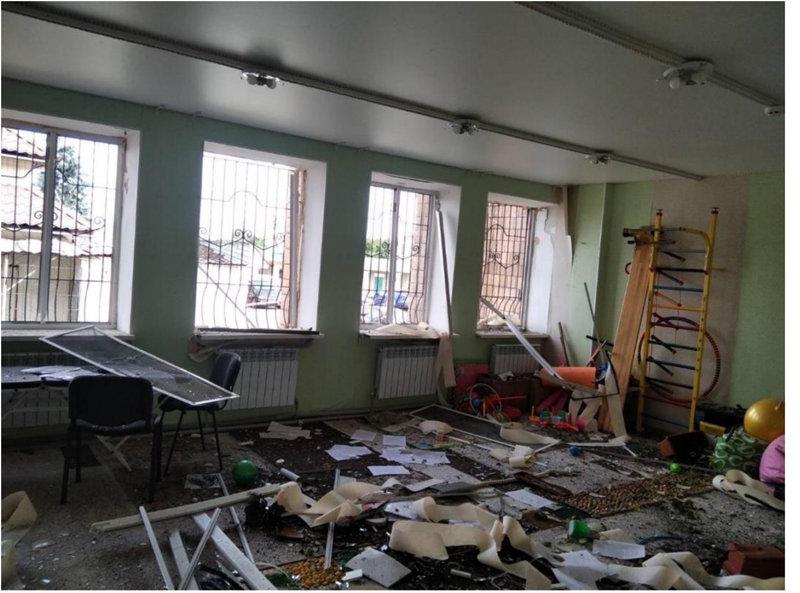
Novyi Bug is a town with a population of more than 15,000 residents. It is situated in the Bashtan district of the Mykolaiv region, in Ukraine. The situation in Novyi Bug remains very unpredictable. At the end of May 2022 there were attacks on the town of Novyi Bug and the Mykolaiv region was hit by rockets and missiles. Many civilian infrastructures, including inclusive resource centers, houses and hospital premises were either destroyed or damaged.
The International Committee of the Red Cross (ICRC) met with the Head of Education in Novyi Bug. As Head of Education, our interlocutor seemed preoccupied with the high level of destruction and its impact on children's learning. One of the education facilities' buildings was hit during the hostilities a few months ago which resulted in shattered windows and walls. No one was injured, and all the specialized equipment had been safely stored away.
Children are now receiving individual sessions online, but the Head of Education highlighted the need to support the most vulnerable children with IT devices to enable some form of access to education and communication with teachers. In total, forty-seven children are enrolled in the Center and are receiving services of various specialties. Twenty-six children are highly vulnerable – not only with physical, mental and learning disabilities – but also because they come from disadvantaged backgrounds and their parents have a low financial income. The Head of Education shared his story and the story of the Center:
Novyi Bug Inclusive Resource Center was founded in 2019 and actively began to help children with special educational needs. Specialists of the Center provide services and resolve issues related to education and educational activities. We assess the learning developmental needs of children and, based on their individual needs and their personality, we adjust their education plans accordingly. The goal is to integrate children into society as much as possible.
I was brought here by a great desire to help families where children have special needs. My goal as a manager was to maintain a center where children would be able to receive free and qualified help. Such centers are created with the mission of working for the benefit of children who need support.
The conflict seriously affected my personal life because it divided it into the period “before the war” and “during the war”. But we're hanging on and we will make it because we are not alone. We are united towards a certain goal. In our work with children, we aim to be even more productive and helpful, now more than ever before.
A missile flew near our center on May 29, 2022, damaging the roof, windows and doors. Despite the ongoing challenges, we want to help with even greater strength the children.
I believe that the Ministry of Education is concerned about children with special needs and those with various forms of disabilities, which is why the Inclusive Resource Center was established. It enabled children to study in schools, and to adapt and socialize. All children with special educational needs can learn together with everyone, so that they do not feel different, oppressed or rejected by society. In my opinion, it is very good that an inclusive form of education is available.
Education is definitely important. Everything starts with children and education: from the kind of person they will grow up into, to who by and how the country is governed. It all depends on education and upbringing.
For me, the most important thing today is for the war to end, for peace to come to Ukraine, and for conflicts between other countries to cease. People should be able to return to their country, to their homes. Children need to see a peaceful life, fall asleep and wake up peacefully. This is my biggest dream. I want to see a beautiful future in a peaceful, independent, prosperous country.
Syria
Iman
Iman is a clinical psychologist. She is Palestinian, and lives in Aleppo, Syria. She has worked in the Aleppo Physical Rehabilitation Program (PRP) since 2019, and provides psychological support to PRP service users, including weapon-wounded. While service users are provided with a prosthesis and go through the rehabilitation process with the physiotherapists, they can also have access to psychological support.
How did the violence/conflict impact your personal life?
During the last ten years, I have both lived and worked in a context affected by the conflict. Conflict has affected everything: my personal, family and social life, my studies, my work. Some moments have been particularly difficult, as when I was under siege for six months, when losing friends and relatives, or when being caught across shooting. I had to postpone my studies because I could not reach the University. Sometimes, I had to drive through long and dangerous roads to reach my work. Now things are a little more secure. But we have been hit by the economic crisis. In addition to the devaluation of the money, we face difficulties to access fuel, electricity, water and other basic needs. But life goes on, and we need to navigate the uncertainty and create new ways to survive and cope.
How do you see that your work impacts the persons you are helping?
I have worked for three years in the Aleppo Physical Rehabilitation Program. Most of the PRP service users that come to the MHPSS [mental health and psychosocial support] service have gone through a traumatic event, leading to the amputation of one or two legs. They are of all ages; the youngest 1-year-old, and the oldest 67. Many of the amputations are conflict-related, for example, shelling, mines or unexploded devices. Also, amputations can be due to complications of diseases due to a lack of access to medical care, such as diabetes.
I facilitate individual, family and group sessions with the service users and/or caretakers. Both service users and caretakers have important mental health and psychosocial needs. But they also have resilience factors, and together we try to identify and strengthen them. I use different techniques, so they can promote their well-being and their daily functionality.
For example, Fatima was the breadwinner of the family. She was an amputee from one leg after she stepped on a mine. Her husband abandoned her with the children. “You are a half woman”, he said. Fatima was overwhelmed. She was feeling guilty, thinking it was her responsibility to have stepped into the mine. She was severely anxious and frustrated. This had an impact on her relationship with her children. She screamed, yelled, and hit them constantly. We had sessions together for eight months, and we found ways to decrease the anxiety, guilt and frustration. For the first time in years, Fatima smiled. We worked on reinforcing her strengths, including her parenting skills. When Fatima felt better, I referred her to vocational training, and then to a micro-economic initiative. Now, she and her children are doing well. She sent me a picture some months ago. She was celebrating a birthday with her children and relatives. She was smiling.
I also work with caretakers, particularly when the service user is a child who has gone through an amputation. Sometimes some parents or caretakers can act over-protecting the child, limiting their autonomy and functionality in many areas of their life. On the other hand, some caretakers can be overwhelmed, and have negative parenting skills, including violence. I remember Mona's aunt, telling her, “if you do not stop crying, they will cut your other leg”. During the sessions, we discuss with the caretakers how they can promote the child's strengths and autonomy.
Another important part of my job is the facilitation of group sessions, where patients having similar conditions and ages can support each other. In these sessions, they share common experiences and challenges. They receive and provide pieces of advice from/to each other, knowing the others understand them, as they have gone and are still going through similar experiences. For example, I remember Abdallah, 16 years old. He refused another correction surgery, as he did not want to go again through the painful process. With the support and the advice of his MHPSS group colleagues, he changed his mind. Sometimes, participants continue their support even after the group sessions are finalized. Friendship can be built. For example, Abdallah was visited after his surgery by his MHPSS group colleagues. I also facilitate some groups with caretakers. They also face extremely difficult situations, that affect their mental health. Sharing with other caretakers can be very beneficial.
COVID-19 had a great impact on my work. The PRP was closed for some weeks, and I had to do remote follow-up sessions, supporting the patients through phone calls, while being myself in this confusing situation. Remote support was complex during this time, as patients usually do not have a room at home where they can be alone for one hour, to have private conversations. And not all the patients had phones. Some days, without electricity, it was even impossible for me to charge my phone and call. It was a release when the COVID-19 prevention measures cooled down, and we could restart the individual and family sessions. But, unfortunately, the group sessions have been suspended for months.
What is your relationship with work?
I consider my work in the PRC [physical rehabilitation centre] highly self-rewarding because I can see the impact of my work on my patients’ life. For example, Sana, 3 years old, came to the centre for her first prosthesis. She was terrified, crying, and kicking the physiotherapists. It was her first experience trying to walk with a prosthesis. Until now, she had only crawled on the floor. I supported her and the psychotherapist team, and together we slowly made her get familiar with the device. It was extremely rewarding for the team to see her after some sessions walking.
But, on the other hand, the exposure to people having gone through extremely highly traumatic events also affects me. Sometimes it is difficult to disconnect and leave the patients’ stories in the office. Disconnecting and separating personal and professional lives need constant self-awareness and effort.
Do you have anything to add?
Looking back on these three years working in the PRP, I realize how many obstacles the team and I have faced, and how we are trying to overcome them day-to-day: the conflict, the insecurity, the COVID-19, the economic instability. We all have gone through intense and mixed emotions during these years: reward, frustration, excitement, fear, success, sadness, and growth. I am satisfied with myself. And I am particularly proud of the positive impact I have had on each patient I worked with.
South Sudan
Ababiku
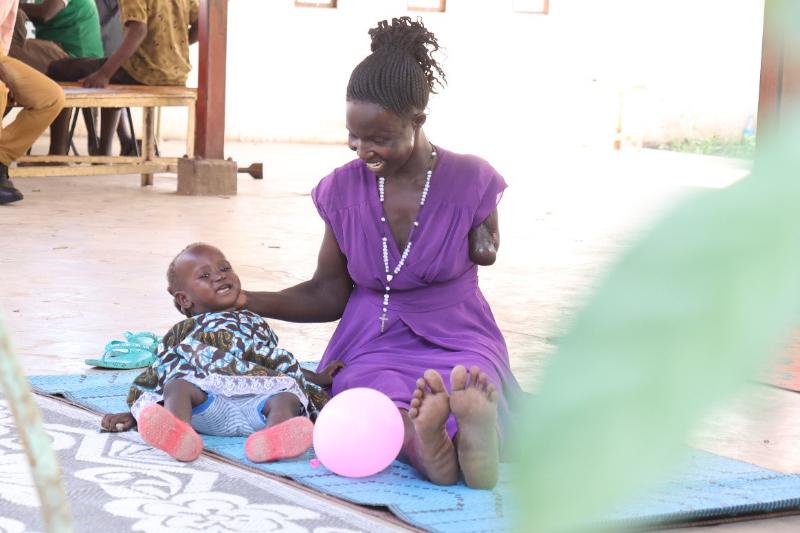
A mother of four children, Ababiku, who had an accident in 2020 along a highway, narrated her painful experience after the accident that had left her without one of her arms. Because of this, Ababiku could not complete her ordinary-level education, and stopped her academic journey earlier than she had planned.
I was involved in a serious car accident in 2020 on the road. We were in a small car which carried seven passengers. I was seated in the front seat beside the driver. Unexpectedly, a big truck hit our car. My left arm was cut off by glass and fell off on the spot. Another male passenger's leg was broken too. I did not understand what happened to the other passengers but I and the man whose leg was broken remained unconscious and helpless. People came and helped us. I then found myself in the hospital.
The truck's driver ran away, and he wasn't found till now. Our driver ran his own way too. No justice prevailed and no one claimed responsibility.
There was a need for support from my family, but my husband, father and brother were jobless. This incident had a terrible impact on my life because people mock and disrespect me. I struggle with shame and lack of support for myself and my children. I cannot manage heavy work with one hand, such as collecting firewood. My social life is impacted when I speak with people. Though people sometimes understand me, I am still missing out on collaboration with some friends and colleagues whom I was interacting with before.
When I came to the physical rehabilitation centre, I received something called counselling. After talking, I felt relieved and better than before. I attended group support where I saw people with different disabilities, and I heard different testimonies on how they struggled and coped with their problems. I compared my life with some of them and I found myself better off than some of the patients I met at the centre. I have also benefitted from help to start a small business, so now I know that life must move on as long as I am still alive.
Elisa
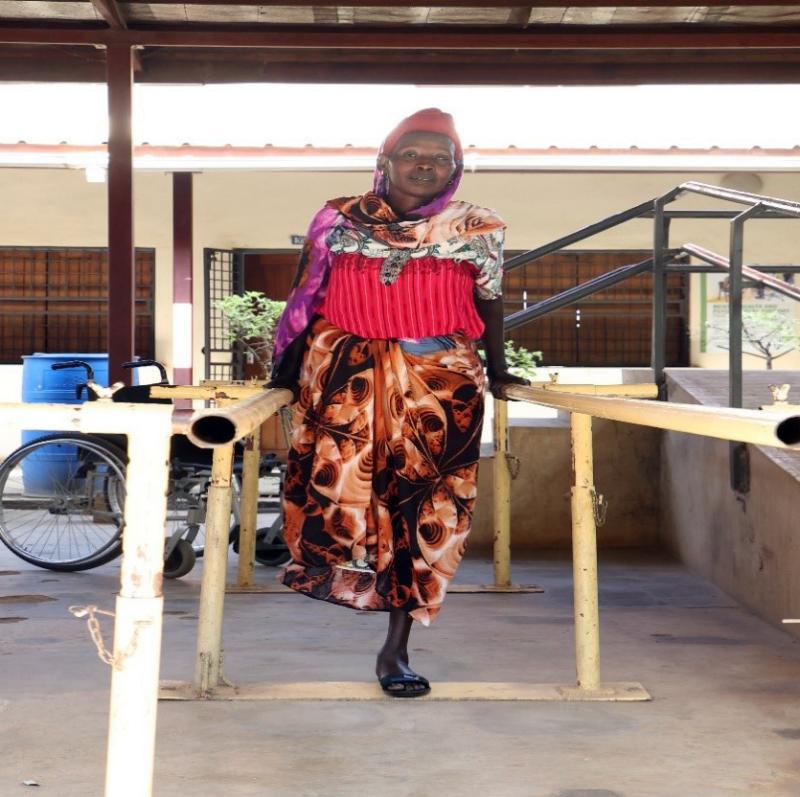
Elisa is a mother of five children, but one of them is deceased. Elisa suffers from diabetes. In July 2008, fighting erupted in her residential area. She was hit by a bullet in the chest in her house. She was flown to the closest metropolis to seek medication.
I was shot in the chest when fighting erupted in July 2008. I was taken to a hospital but upon reaching, another fighting started, and the movement was limited and I could not see a doctor. I stayed at home for three months. I was sick with diabetes at the same time and this was getting worse, my right leg was terribly swollen and kept on increasing. After three months, I was taken to the hospital and the doctor said there was no treatment to recover the leg, and the only option was to amputate it because the infection was increasing. My chest was also scanned through X-ray, and the bullet was found deeply hiding in the ribs. The doctor could not do the operation because it was too risky for my life. Until now the bullet has not been removed.
My children and I got support from my mother. My husband has stopped supporting us since 2010. He does not care since I was amputated. I came to the physical rehabilitation centre to get a prosthesis and in that centre, I attended counselling sessions for the first time which helped me a lot to relieve my constant worry, thinking too much, and the sleeplessness I was facing. Before counselling sessions, I was covered by a spirit of shame, people seeing me amputated and me walking with crutches was challenging.
My 19-year-old daughter cannot go to school anymore as she is working in a restaurant to support us. My mother who was supporting us got an eye problem and she cannot do anything now. I was hopeless and worrying about the future of my children but after visiting the centre and talking to people I learned how to manage my stress, identify the symptoms, and take better care of myself, also connecting with other amputees during a group session. I made new friends, I am still in touch with them after leaving the centre.
Benjamin
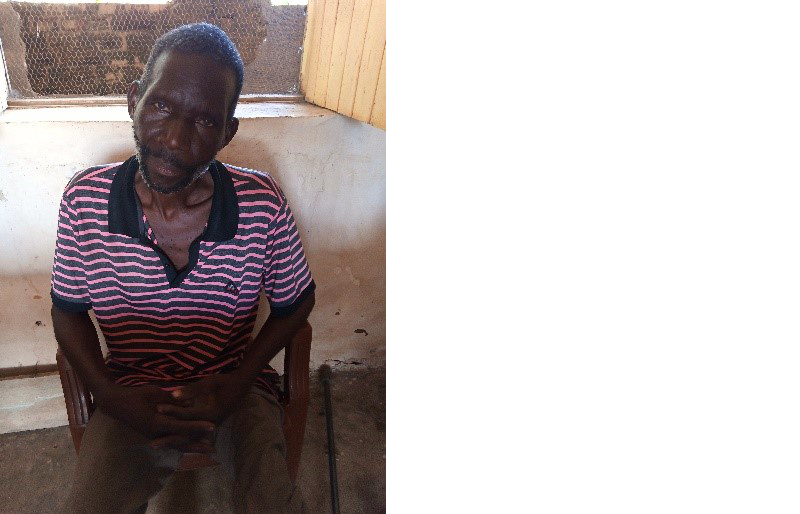
Benjamin is a 40-year-old man who was injected with the wrong medicine as a child. Since then, he has experienced walking issues and suffers from insecurity due to armed conflict.
I am Benjamin, I am 40-year-old. I contracted disability due to a wrong injection of Chloroquine by a nurse at Wau Teaching Hospital when I was 7 years old. I was sick with Malaria, and taken to the hospital for treatment and that is where I was injected with Chloroquine. The injection swelled and led to paralysis of my left leg. I had a terrifying life during the conflict in 2016 and 2017, and as a disabled person I was totally vulnerable. It was very difficult to move but my family and I survived as we had run to the UN camp for safety. I have experienced a lot of challenges and difficulties in my life such as walking problems, and daily stress due to family socio-economic status until I came across services provided by the ICRC.
I have benefitted from other humanitarian support with food and shelter, but the unique support provided by the ICRC such as crutches were more important to me. I also had a small financial support to start my business, and I was offered counselling. These services were incredible and amazing. From today onward, the most important thing to me is that I was heard. My physical condition will not change but I am in good spirit and because of that I will be an agent of mental health by referring and advising my friends who are suffering psychologically to seek for psychological support from the ICRC like me. This has helped me and is continuing to help me.
Hussein
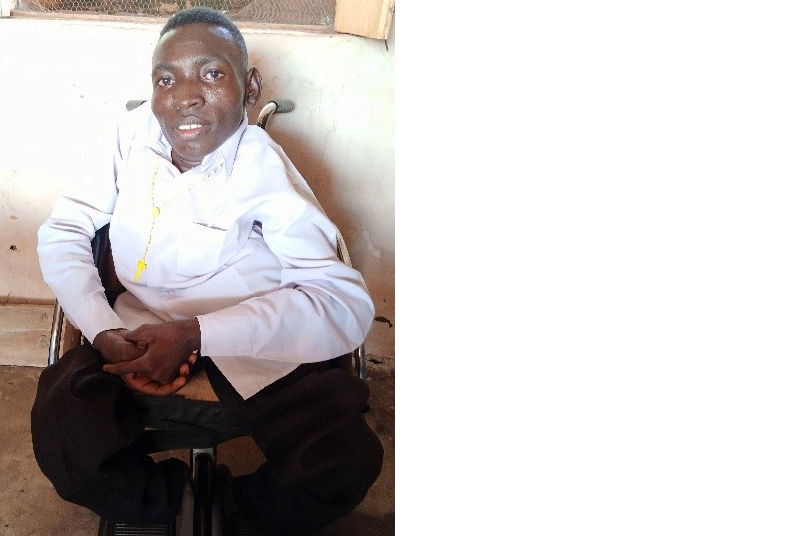
Hussein is a 26-year-old man who has had struggles since the age of 3 years, when he became paralysed. He was abandoned by his mother and suffered terribly from the war.
My name is Hussein, I am 26-year-old, and I completed the secondary school this year 2022.
My birthplace is 311 km away from the closest metropolis. I developed severe sickness at the age of 3. I was taken to the hospital, but my health could not improve, hence I became paralysed.
When my mother realized that I could no longer walk, she abandoned me. My grandmother (mother of my mother) took care of me and sent me to school until the present day.
In 2016, the war broke out in my town and my grandmother's properties were looted and houses destroyed. My grandmother ran to the closest metropolis leaving me behind in the conflict. It was a very challenging and difficult time for me. I was with no help, no moral support, no strength. I was brought to the closest metropolis by the ICRC team after an outreach visit in 2017 and was given a wheelchair. I found my grandmother there. My first humanitarian support was when the ICRC provided me with free transport and gave me a wheelchair.
The violence and disability have impacted my life badly as I almost died of hunger and of stress of being abandoned and left alone. There was no support from anybody until I was brought to the closest metropolis by the ICRC. Despite being brought here and given a wheelchair, I had been planning to commit suicide because of several reasons; I am very poor, I can't walk, rejected by my mother, and nobody is providing good care to me, especially food. My grandmother is struggling, and I saw myself as a burden to my old grandma. Nobody supported me for school requirements as my grandmother had no financial power.
However, the support of the ICRC has changed my life to an unexpected level. The ICRC supported me with cash money that helped me set up my business. I also got help by getting psychological support every week, where all the stress and bad thinking I have been going through has been discussed and I build on resilience. Also, the ICRC team had been campaigning for my employment as a disabled person, and I was recently appointed as the Secretary-General for Hearing Impairment Association in the city. Now, I am a leader, my business is going on well, I completed my secondary school through ICRC support, and all the stress has totally gone. I learned to manage stress through counselling sessions. I do see my future is now very bright as I am waiting for University admission.
Victoria
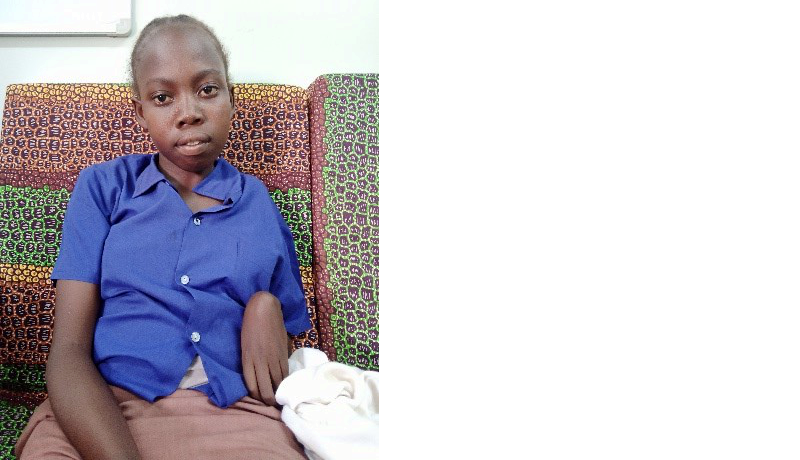
Victoria has been disabled since she was a child. She has suffered from bullying and has felt depressed and alone since then. The context of violence has not made it easier for her.
My name is Victoria, I am 21-year-old. I got disabled due to a severe sickness that I had between the age of 6 to 8.
This sickness led to permanent paralysis of my left hand and leg. The violence that erupted in 2016 and 2017 disrupted my life seriously, as well as school. All our properties were looted, and our house was burned down to ashes among others. Throughout my lifetime, I used to isolate myself from other children including my siblings because of my disability. Children used to laugh at me, bully me, and mock me as well as say all disturbing words against me both at home and school.
Because of this, I preferred to stay alone and didn't mix with them. I didn't play with the children though my aunt tried to convince me to stay with my siblings, school children and our neighbour's children, but I would never accept. The only thing that was in my mind was to commit suicide because God didn't like me, otherwise he wouldn't have let me be disabled.
However, I thank God that he brought the ICRC team to help me. The ICRC gave crutches to help me walk and go to school, supported me with money and, most importantly, provided me with psychological support. I shared with the ICRC counsellor how I was being treated by school children, neighbours’ children and my siblings, and I also revived the violence in 2016–2017 as I still had memories of it. The ICRC counsellor gave me a lot of emotional support together with my aunt. My aunt used to accompany me to the ICRC for counselling sessions, my aunt participated together with me in some sessions, and she took some words and helped talk to my siblings and neighbours to avoid bullying me. My aunt was very supportive, even at home she was trying her best to provide the counselling herself. Now, I am completely happy! I don't think of suicide again, and I am now living happily and going to school.
All the stress that I have been going through for so long has gone, and everything has been addressed together with the ICRC team. The business that I have set up using the money given to me by the ICRC is now progressing very well, and my sisters and brothers are helping me to grow it further. If it wasn't for ICRC support, my life would have not been the way it is today. I have now gained respect as a complete human being.
Lebanon
Haya Rawi
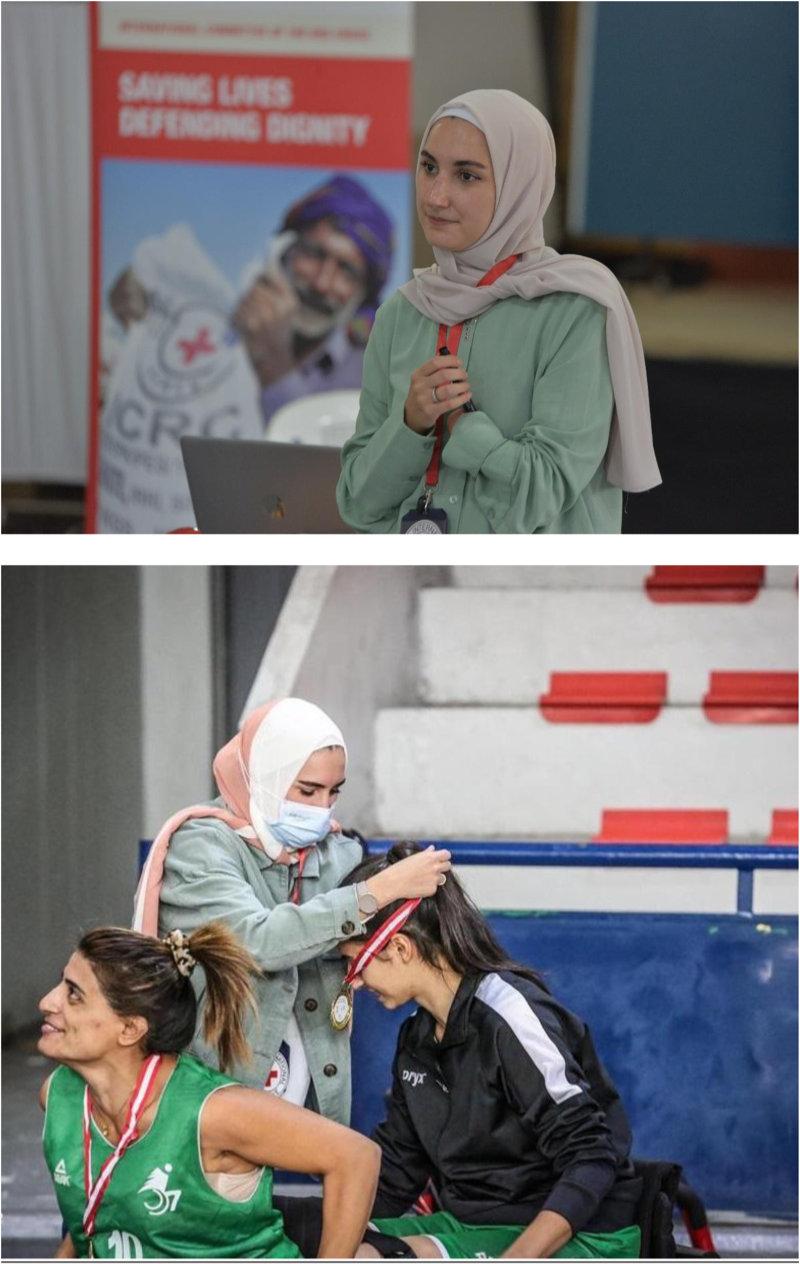
Haya Rawi works as a disability inclusion advisor with the ICRC in Lebanon. Her role is to ensure the inclusion and participation of persons with disability in society, through societal inclusion programmes which involve sports, socio-economic projects and disability awareness.
Since Haya was born, her impairment (upper limb amputation) has been a motivation and a reminder to be strong and to challenge both herself and society. She studied architecture, and her career led her to the humanitarian field.
When you ask Haya what she enjoys about her work, you immediately hear the enthusiasm in her voice:
Working in this field has helped me accept my own impairment. I feel more empowered and more self-confident when I help and support other people – especially those with disability. I really like to empower other people, by listening to their challenges and stories. You know, sometimes people just want to talk about what they are going through. I feel grateful when they share their story with me.
Haya feels that she learns a lot from persons with disability and is eager to organize many events to encourage their inclusion. Among those events, she and her team have set up various initiatives related to career development, access to nature (e.g. hikes), or sports (e.g. wheelchair basketball).
Recently, Haya has been working with Fatima, who accepted to share her story.
Fatima is a 44-year-old Lebanese woman. She was amputated at upper and lower extremities (leg and hand fingers) when she was young. She remembers: “In 1981, I held a toy while playing in the yard. The toy was a mine; at that time, we were at war with Israel. I was with my mother and brother. My mother was injured, and my brother died. I still remember that moment. I was suffering from severe pain.”
For years, she felt helpless and desperate because of her disability. It affected her relationship with her family and especially her mother. Her mother would always blame her for the accident. Fatima recalls: “I used to speak to the mirror and cry because no one was there to listen to me. I used to stay at home to hide my disability.”
The injury affected her physically, mentally and socially. She felt deprived of things other girls her age could do, like wearing non-medical shoes or clothes, and playing with her friends: “I couldn't continue my education due to many reasons: the level of the school, the motivation, and the follow-ups from my parents to study, because my mother was injured as well.”
Before she was married, when she met someone, she would try not to move too much to prevent her from showing her disability. But then she met the man who is now her husband: “He is so supportive and always helps me doing some tasks.”
Fatima is now married and has two children and when you ask her what the most important thing for her today is, she answers immediately: “My children. I am dedicating my life to them.” Fatima's dream is to see her children grow up to be healthy, happy and successful.
Still today, Fatima feels that she can speak more easily with people who have experienced a similar situation: “I prefer to speak about my disability with persons with a disability because we have the same case, and they will understand me.”
When you speak about Fatima with Haya, something comes out clearly. Haya deeply cares about others and feels happy to bring help and support through her work. She recalls that Fatima would hold back on the first day that they met. But as they met again, Haya felt that Fatima would be more and more open about her story. “The communication would improve over time”, says Haya.
Fatima went through the Career Development Program and received some training and support from the Economic Security Department of the ICRC. Haya is hopeful that Fatima will soon open her own business and will be more open to talking with others about her story.
Congo
Centre Nguvu Yetu pour Enfants Sourds et Défavorisés
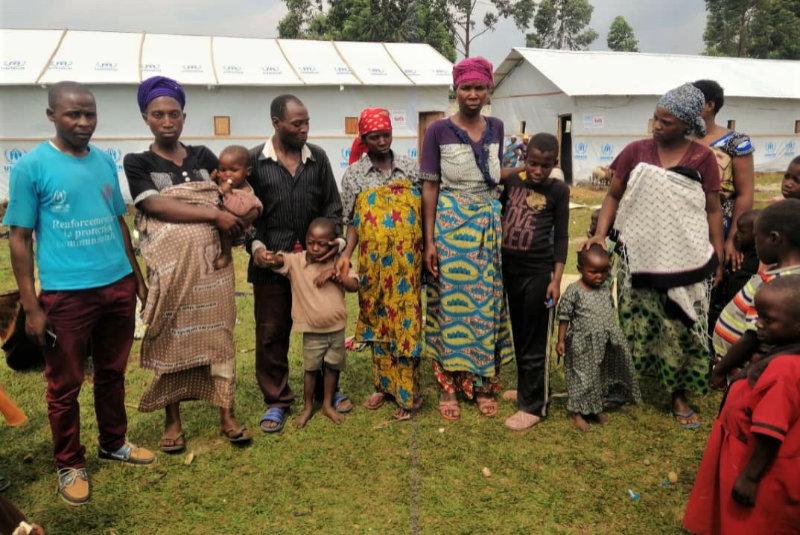
Kamonyo is the Director of CENYESED (Nguvu Yetu Centre for the Special Education of Discriminated Deaf Children). He agreed to share the story of his fight for children with disabilities.
I met my wife in Nigeria as a teacher. My wife and I married on July 22, 1988. Beatrice was a teacher at the Institute for the Deaf and Mute in Kinshasa. She was a truly wonderful help in my vocation to create the Hope for the Deaf School in Kisangani, to set up the schools in Lubunga, Mbandaka, Buta and Uvira, and to train the teachers.
She advised me to think of the deaf and other discriminated children such as the deafblind in rural areas, and together we created a school in Rutshuru and then in Masisi. Beatrice always considered these children as her own and educated them with the same heart. She was called to join the Lord in 2018 and left me to continue the vital work we had started together.
Three years after Beatrice left, I could no longer bear the weight of loneliness. In 2021, I met Apolline whose vocation was to work with the most vulnerable. We got married in September 2021 and at the same time made a commitment to support the deafblind. For the moment, Apolline is pursuing her studies in the United States, while we are continuing the implementation of the school for the deafblind in Goma (North Kivu, Democratic Republic of Congo). Although, Apolline is not deaf, she will master in a short time the sign language, a proof of her love.
We are in the process of organizing an inclusive education. Currently, we have set up two dormitories in our own house and two classrooms. We try to eat what God gives us while we wait for God's help.
The deafblind children come to us mainly from Masisi, Rutshuru, Nyiragongo and Goma. Most of the parents who are victims of the conflicts are impoverished and suffer from the context of insecurity.
The armed conflicts have negatively affected the schools in Masisi and Mweso because teachers, due to lack of salary, have stopped teaching deaf people. In Rutshuru, Masisi and Nyiragongo, children, youth and adults with disabilities are greatly affected by the armed conflicts. Parents are impoverished and unable to provide for themselves, their fields and small livestock are looted, houses are burned down or are in unsanitary conditions.
Blind people are very affected. Some parents live in despair believing that their child will not be able to feed, educate or communicate properly. As such, there are many orphans. A priority and necessity is to build an orphanage to facilitate the reception of these orphans. CENYESED is an organization that I founded several years ago and that takes care of deaf and deafblind children. They are taken care of until the situation becomes stable in their home area. CENYESED also aims to provide home-based education to help the community understand disability, deafness, deafblindness, autism and handicap to strengthen a grassroots community intervention.
The school for deaf children in Kiwanja
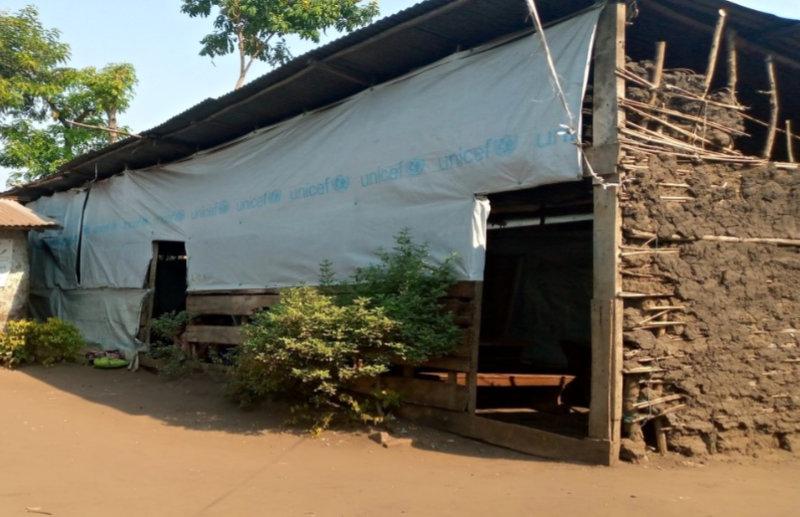
The school for deaf children in Kiwanja has been caring for more than 150 deaf and disabled children for over more than two months. It is now occupied by rebels. The children should have been back at school in September but as the rebels are still present in the community and in the school, we are organizing ourselves to see how we can help the children. Our current concern is that all the parents of these deaf children are affected by the war, and this will cause a great problem to organize themselves and meet the needs of the children for the start of the school year.
The war has impoverished the parents and prevents them from caring for their children. There are several cases of orphans. The war also prevents the Kiwanja School from having access to funding, and has led to the flight of teachers.
Nyirasafari
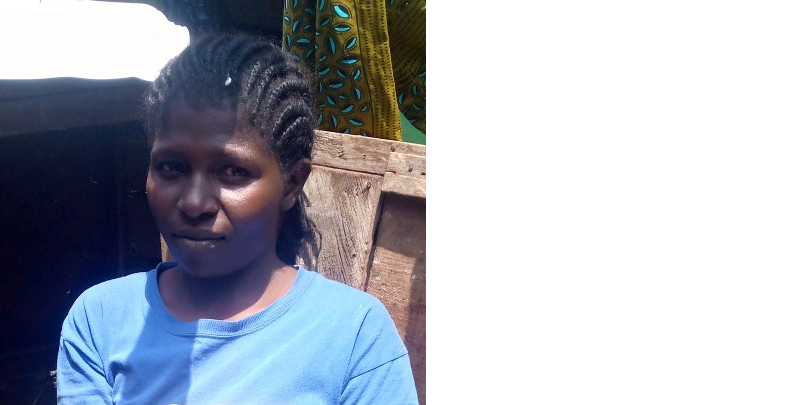
We recently had the case of a young deaf woman named Nyirasafari. She is 27 years old and was the victim of armed conflict in the Masisi territory. She was raped several times by armed men and, as a result, became pregnant. She currently lives with her two children, one who is deaf-mute and the other who is deafblind. Following the poor living conditions of people living in rural areas, now the young woman leads a difficult life where she must manage her traumas and at the same time ensure the care for her two children.
The young woman and her two children are now refugees within the organization CENYESED, where they are cared for until the situation returns to normal in their region of origin.
Alexander
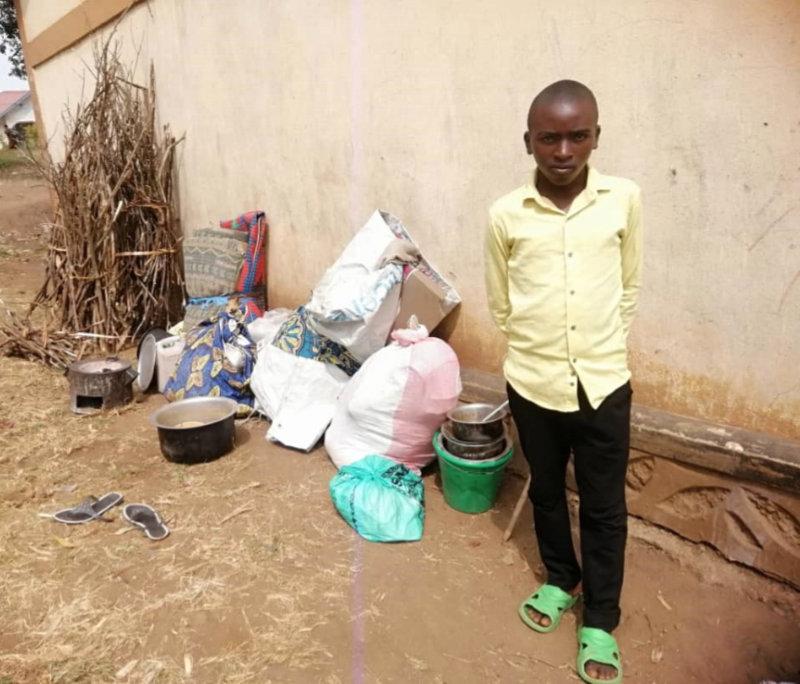
Alexander is a deaf boy from the Masisi territory. He was captured by a rebel group recently. Despite his disability and without his will, he has become a soldier of the rebel group. Since the beginning of the year in this region we have recorded the death of two deaf people, who were killed by the rebel groups as they disagreed to join the rebels. Our association, which operates in this territory, gave us the information that the young boy was taken by force, and today we have started the process of withdrawing this boy from this armed group so that he can resume a normal life.
Drawings from Iman's mental health and psychosocial support sessions in Aleppo's physical rehabilitation centre
A world full of monsters
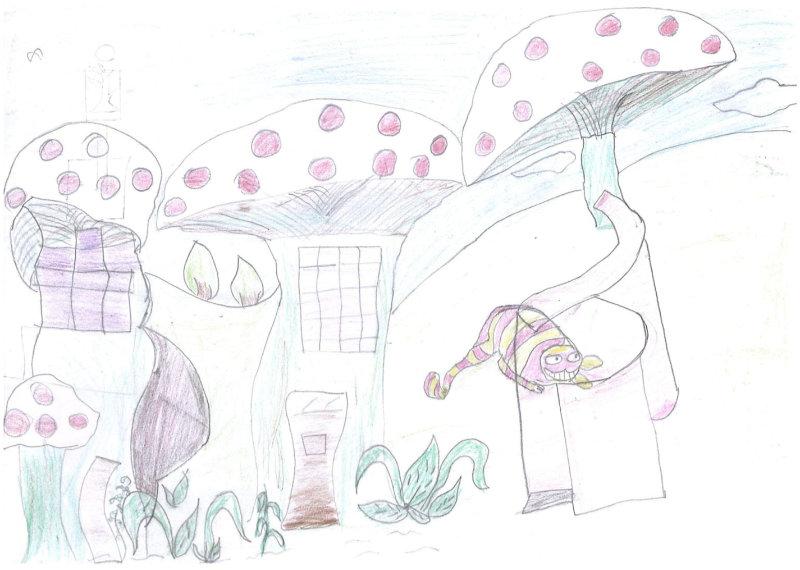
Although the weather is sunny, all doors and windows are closed because we are afraid of the monster! What would happen if we drew a fence around it to keep us safe? Nothing would happen. What is the benefit of one fence in a world full of monsters?
Abd, 8 years
I am perfect
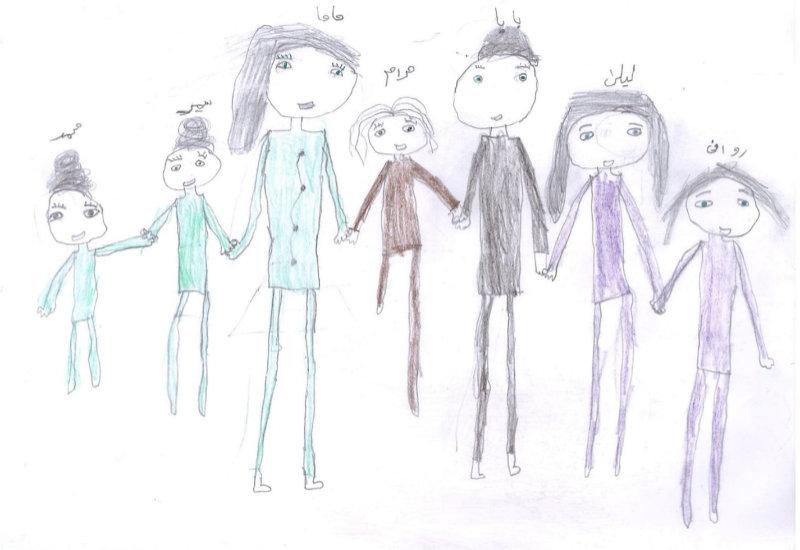
I painted myself this way because my home is the only place where I don't have to hide my amputation, and at the same time, I don't feel like I'm inferior to others.
Maram, 7 years
Body map of feelings
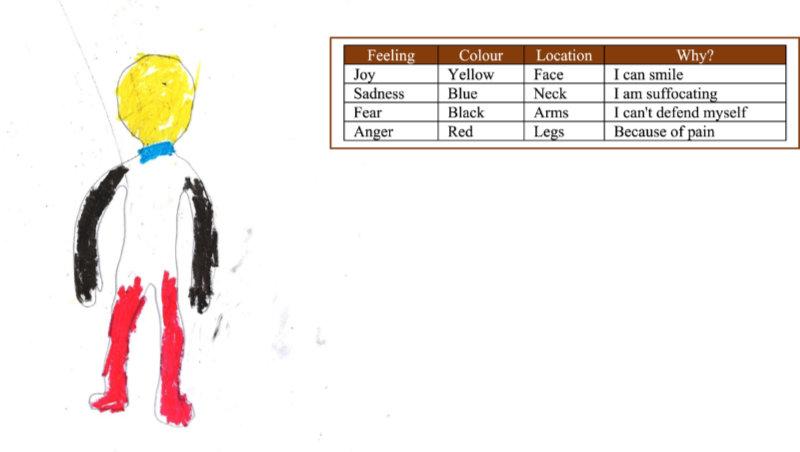
Ahmad, 11 years
One step in front of the other
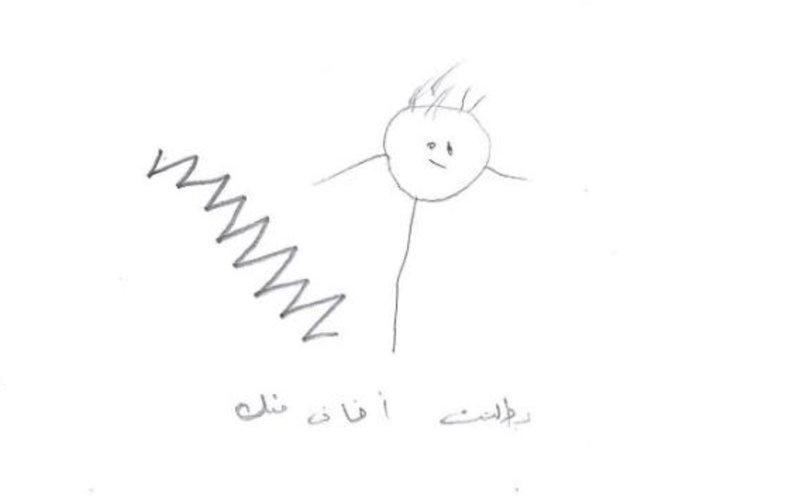
Aya, 6 years
Putting one step in front of the other or climbing a stair is a daily routine for us, but for Aya it was a frightening experience she will avoid. These fears make children feel incapable and limit them from reaching their full potential.
After six MHPSS sessions, Aya is ready to leave her wheelchair, use a prosthesis and face her daily challenges.
